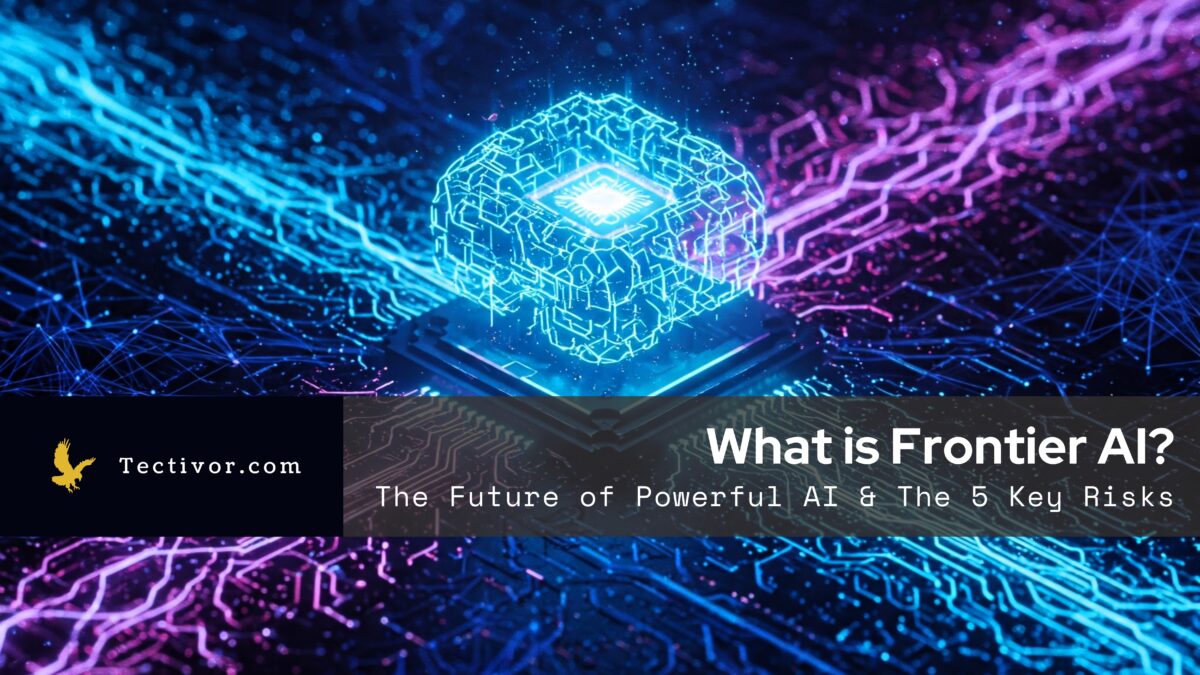The term frontier ai is increasingly entering public discourse, sparking both excitement and apprehension. It conjures images of incredibly intelligent systems capable of solving complex problems and transforming industries. But what exactly is Frontier AI, and why is there such a strong call for its regulation? In this blog post, we’ll delve into the definition of these cutting-edge artificial intelligence models, explore their potential impact on society, examine the inherent risks they pose, and underscore why proactive ai regulation is not just advisable, but absolutely essential for navigating the future of technology.
The growing importance of AI is undeniable. From powering our smartphones to influencing financial markets, AI is already deeply integrated into our lives. However, frontier ai represents a significant leap beyond current capabilities. These are not your average machine learning algorithms; they are models of unprecedented scale and complexity, pushing the very boundaries of what AI can achieve. This rapid advancement has naturally captured public interest, raising questions about both the immense possibilities and the potential pitfalls that lie ahead.
Table of Contents
What Makes an AI Model ‘Frontier’?
Defining frontier ai isn’t always straightforward, as the field is constantly evolving. However, several key characteristics distinguish these models from their more conventional counterparts:
Advanced Capabilities:
At its core, a frontier AI model exhibits capabilities that were previously thought to be years away. This includes:
- Generalization: The ability to perform well across a wide range of tasks, even those not explicitly trained for. Think of a language model that can not only generate text but also translate languages, write code, and even engage in creative brainstorming.
- Emergent Properties: These are unexpected and novel abilities that arise as a result of the model’s scale and complexity. For instance, large language models have shown surprising in-context learning abilities, allowing them to learn new tasks from just a few examples within a prompt.
- Near-Human or Superhuman Performance: In specific domains, frontier AI models can approach or even surpass human-level performance, whether it’s in complex reasoning, strategic game playing, or scientific discovery.
Scale, Data, and Compute:
Achieving these advanced capabilities necessitates an unprecedented investment in:
- Scale: Advanced AI models often boast billions or even trillions of parameters – the adjustable variables within the neural network that learn from data. This massive scale allows them to capture intricate patterns and relationships.
- Data: Training these models requires vast datasets, often encompassing a significant portion of the publicly available information on the internet and beyond. The quality and diversity of this data are crucial for the model’s performance and generalization.
- Compute: Training and running these massive models demands immense computational resources, often requiring specialized hardware like powerful GPUs and vast data centers. The sheer energy consumption associated with Frontier AI is itself a significant consideration.
Examples of Frontier AI Models:
Several recent AI models exemplify the characteristics of frontier ai:
- GPT-4 (OpenAI): A multimodal large language model capable of processing and generating text, images, and other data types with remarkable fluency and coherence. Its ability to handle complex instructions and generate creative content has positioned it as a foundational frontier ai model.
- Claude 3 (Anthropic): Known for its strong reasoning abilities, nuanced understanding of context, and commitment to safety, Claude 3 represents another significant step in frontier ai development.
- Gemini 1.5 (Google): This model showcases an exceptionally long context window, allowing it to process and understand vast amounts of information in a single input. This capability opens up new possibilities for complex reasoning and information retrieval.
These examples highlight the rapid progress in the field and underscore the transformative potential of advanced AI.
The Role of Frontier AI in Society
The implications of frontier ai across various sectors are profound. Its ability to process information, automate tasks, and generate novel insights could revolutionize how we live and work:
- Education: Personalized learning experiences tailored to individual student needs, AI-powered tutoring systems that can provide instant feedback, and automated grading could transform the education landscape.
- Healthcare: Faster and more accurate diagnoses through advanced image analysis, the discovery of new drugs and therapies, and personalized treatment plans based on individual patient data are all within the realm of possibility.
- Scientific Research: Accelerating the pace of discovery by analyzing vast datasets, simulating complex systems, and generating new hypotheses in fields like climate science, materials science, and fundamental physics.
- Industry: Automation of complex tasks in manufacturing and logistics, optimization of supply chains, and the creation of entirely new products and services driven by AI-powered insights.
- Communication and Creativity: Generating high-quality content, translating languages in real-time, and assisting with creative endeavors like writing music or designing art.
- Decision-Making: Providing powerful analytical tools for businesses and governments to make more informed decisions based on data-driven insights.
The potential benefits of frontier ai are immense, offering the promise of increased productivity, greater efficiency, and solutions to some of humanity’s most pressing challenges.

The Risks Associated with Frontier AI
However, alongside these exciting possibilities come significant risks that cannot be ignored. The very capabilities that make frontier ai so powerful also make it potentially dangerous if not developed and deployed responsibly. Key concerns include:
- Misuse: Powerful AI models could be exploited for malicious purposes, such as generating sophisticated disinformation campaigns, developing autonomous weapons systems, or launching cyberattacks with unprecedented sophistication.
- Bias: If trained on biased data, advanced AI models can perpetuate and even amplify existing societal inequalities, leading to unfair or discriminatory outcomes in areas like hiring, loan applications, and criminal justice.
- Misinformation: The ability of frontier ai to generate realistic text, images, and videos makes it a potent tool for creating and disseminating misinformation at scale, potentially undermining democratic processes and social stability.
- Loss of Control or Unpredictable Outcomes: As AI systems become more complex and autonomous, there is a growing concern about the potential for unintended consequences or even a loss of human control over these powerful technologies. This is a core concern within the field of ai safety.
- Economic Disruption: While automation driven by frontier ai can boost productivity, it also raises concerns about widespread job displacement and the need for societal adaptation to a changing labor market.
- Existential Risks: While perhaps less immediate, some researchers and policymakers are also considering longer-term, low-probability but high-impact risks associated with the development of artificial general intelligence (AGI) that surpasses human cognitive abilities.
These risks underscore the urgent need for proactive measures to ensure the safe and beneficial development of advanced AI.
Why AI Regulation Is Critical Now
Recognizing the immense potential and the significant risks associated with frontier ai, governments and international bodies are beginning to step in to establish frameworks for its development and deployment.
- Government Initiatives: The UK AI Safety Summit brought together global leaders to discuss the risks and opportunities of advanced AI. The White House Executive Order on AI outlines a comprehensive strategy for managing AI risks and harnessing its benefits. The European Union’s AI Act aims to establish legal requirements for high-risk AI systems. These initiatives signal a growing global consensus on the need for ai regulation.
The argument for early regulation is compelling. Just as we have regulations in place for other powerful technologies like pharmaceuticals and nuclear energy, establishing guidelines for frontier ai now can help to:
- Promote Safer Development: Regulations can incentivize developers to prioritize ai safety research and incorporate safety measures into the design and training of these models.
- Mitigate Potential Harms: Clear rules and standards can help to prevent the misuse of AI and address issues like bias and the spread of misinformation.
- Foster Public Trust: Establishing a regulatory framework can build public confidence in AI technologies and facilitate their responsible adoption.
- Ensure Accountability: Regulations can clarify responsibility in the event of AI-related harms, fostering greater accountability among developers and deployers.
This proactive approach aligns with the principles of responsible ai, which emphasizes the ethical development and deployment of AI systems that benefit society as a whole while minimizing potential negative consequences.
Companies and Initiatives Leading the Way
Several leading AI companies and initiatives are actively working on advancing responsible ai development alongside pushing the boundaries of AI capabilities:
- OpenAI: While developing highly capable models like GPT-4, OpenAI has also invested in research on AI safety and has publicly advocated for ai regulation. They have implemented measures like red teaming to identify and mitigate potential risks.
- Anthropic: Founded with a strong focus on AI safety, Anthropic emphasizes the development of “helpful, harmless, and honest” AI systems like Claude 3. They actively contribute to research on interpretability and safety protocols.
- DeepMind (Google): DeepMind has made significant breakthroughs in AI research while also dedicating resources to understanding and mitigating potential risks. Their work on areas like AI ethics and safety engineering is crucial.
- Frontier Model Forum: This industry body, comprising leading AI companies, aims to advance the safety and responsible development of advanced AI models through research, best practices, and public engagement.
These efforts demonstrate a growing awareness within the AI community of the importance of responsible ai and the need to proactively address the challenges posed by increasingly powerful models.

The Road Ahead: Balancing Innovation & Safety
The future of frontier ai hinges on our ability to strike a delicate balance between fostering innovation and ensuring safety. Stifling progress through overly restrictive regulations could hinder the immense potential benefits of this technology. Conversely, unchecked development could lead to unforeseen and potentially harmful consequences.
Responsible innovation is the key. This involves:
- Prioritizing Safety Research: Investing in research to better understand the potential risks of frontier ai and develop effective mitigation strategies.
- Developing Robust Evaluation Metrics: Creating benchmarks and methods to rigorously assess the capabilities and limitations of advanced AI models, including their safety characteristics.
- Promoting Transparency and Interpretability: Making AI systems more understandable to humans, allowing for better oversight and the identification of potential biases or flaws.
- Fostering Collaboration: Encouraging open dialogue and collaboration between researchers, policymakers, and the public to navigate the ethical and societal implications of frontier ai.
The ideal path forward involves a synergistic approach: open research that pushes the boundaries of AI capabilities while being guided by thoughtful and adaptable ai regulation that ensures these advancements benefit humanity safely and equitably.
Conclusion
In conclusion, frontier ai represents a transformative force with the potential to reshape our world in profound ways. Understanding its capabilities, acknowledging its inherent risks, and proactively engaging in ai regulation are not just important – they are crucial. As this technology continues to evolve at an unprecedented pace, it is our collective responsibility to stay informed, engage in thoughtful discussions, and advocate for a future where the power of frontier ai is harnessed for the betterment of all.
Stay informed about the rapidly evolving field of AI safety and consider exploring resources from organizations dedicated to responsible AI development.
💡 Stay ahead of the future! Follow us on:
Facebook | LinkedIn


